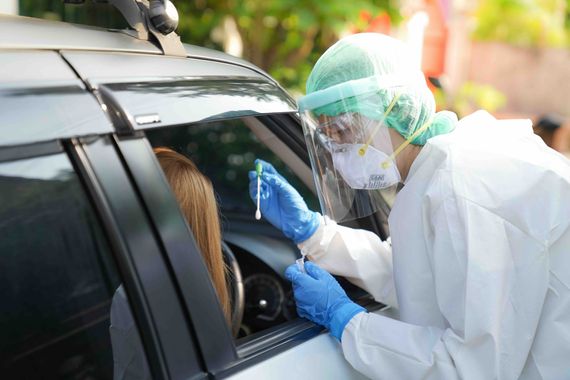8 July 2024

Rapid AI-Assisted COVID-19 Diagnostic Test
Background
The COVID-19 disease, caused by the SARS-CoV-2 virus, rapidly escalated into a global pandemic, affecting over 700 million individuals worldwide in just four years. This rapid transmission is primarily attributed to person-to-person spread and the prevalence of asymptomatic or mildly symptomatic carriers. The resulting impact on societies and economies worldwide has been profound. Early detection of the disease plays a pivotal role in controlling the spread of COVID-19, especially when complemented by robust track and trace surveillance systems. The COVID-19 gold standard test, RT-qPCR, although highly accurate, poses challenges due to its time-consuming nature and the need for specialised laboratory equipment. rapid and accurate diagnostics; highlighting the need for more accessible, rapid, and portable diagnostic solutions in the fight against COVID-19.
How Vidiia Got Involved
During the first COVID-19 lockdown, Vidiia started working in collaboration with the University of Surrey, Brunel University, Lancaster University and the NHS to develop a rapid test for COVID-19. Vidiia brought their expertise in test kit design, artificial intelligence (AI) and device manufacturing, to accelerate the test development and build an AI-assisted and smartphone connected rapid diagnostic platform.
Key Features:
Accurate results, 30 mins: the developed RT-LAMP assay, paired with the AI-LAMP VIDIIA Hunter platform, demonstrated high specificity (100%) and sensitivity (98%) when tested on clinical samples, with a dynamic range of viral loads.
Affordable and portable equipment: the VIDIIA Hunter platform represents a cost-effective and scalable solution for rapid COVID-19 testing, with potential applications in various healthcare and research settings.
All variants of concern detected: all variants of concern tested between December 2020 and March 2024 were detected by the VIDIIA Hunter.
Approval for medical use in the UK: thanks to the above-described features, the VIDIIA Hunter was approved under the UK Health Security Agency’s Medical Devices (Coronavirus Test Device Approvals, CTDA) Regulations 2022.
Journey So Far
The AI-RT-LAMP assay and VIDIIA Hunter platform have been commercialised and approved for medical use in the UK (CTDA, (https://www.gov.uk/government/consultations/coronavirus-test-device-approvals-ctda-call-for-evidence/coronavirus-test-device-approvals-ctda-call-for-evidence). The results of the study have also been published in Frontiers in Molecular Biosciences (https://www.frontiersin.org/articles/10.3389/fmolb.2023.1144001/full).
Further Impact
Further research is ongoing to explore the platform's compatibility with other diseases and its potential for multiplexing. Pilot trials have validated its feasibility and affordability, paving the way for widespread adoption and utilization in healthcare systems worldwide.
Outcomes of the Assay Accelerator Service Stages:
Design - RT-LAMP primers specific to SARS-CoV-2.
Development - Data set for the primers against synthetic DNA, including LOD studies.
Optimisation and Validation – Dataset on RNA extracted from NHS patient samples. Confirmation of test parameters including amplification time and temperature.
Adoption and Impact testing - Data set of 400 NHS patient Covid-19 samples with comparison to PCR from the lighthouse laboratories, this was used to determine clinical sensitivity and specificity. Study was also performed to create a report of the primers efficacy on the Variants of Concern. These reports and datasets were used for the CTDA application and approval.
Vidiia's Covid-19 test was approved for medical use in the UK by the CTDA and is now commercially available.

